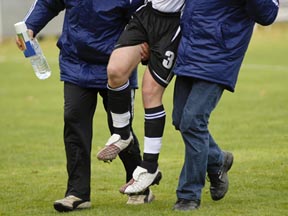A competition-ending injury before the Olympic Games can be devastating for an athlete forced to wait another four years to compete. But overcoming health challenges is par for the course, says one University of Alabama at Birmingham expert who has practiced what she preaches.
 “Olympic athletes, and Olympic hopefuls, train and prepare their entire lives for this two-week event — it’s their dream — so missing competition at the international level can be devastating at first,” says Lauren Whitt, Ph.D., UAB Wellness coordinator.
“Olympic athletes, and Olympic hopefuls, train and prepare their entire lives for this two-week event — it’s their dream — so missing competition at the international level can be devastating at first,” says Lauren Whitt, Ph.D., UAB Wellness coordinator.
Whitt knows the frustrations that arise after being forced off the field due to injury. After helping the U.S. Youth National Soccer Team win gold as a goalie in the 1999 Pan American Games, she tore her ACL and MCL — two of the four major ligaments of the knee — and lateral and medial meniscus cartilage. The she re-tore her ACL a second time requiring rehabilitation for another six months.
“After each of my two knee injuries, I had to re-learn basic skills like walking and running plus sport-specific techniques like diving and striking a soccer ball,” Whitt says. “But when a serious injury takes you out of the game, you have to decide if you will let it get you down and depressed or if you are committed to refocusing on your rehab and other parts of your game, like mentality or strategy, that don't require physical demands.
It’s also important that athletes on the rebound follow the direction of a medical professional, says Marcas Bamman, Ph.D., director of UAB Center for Exercise Medicine.
|
“Health challenges are just one type of setback. Don’t let these stop you; learn a valuable lesson, seek ways to improve yourself and re-focus on the goal you are trying to achieve — whether it be making it to the Olympic Games or getting a promotion at work.” |
“High-level athletes are highly motivated; when they get medical clearance to begin training they are going to push to the absolute limit of what is suggested to them,” Bamman says.
“Athletes have to work their way back to their previous exercise intensity and volume. If you jump right back in it could cause further injury,” Bamman says.
“Athletes’ success is internally driven, and often they are so driven that others will have to tell them to put on the brakes,” Bamman says.
Whitt says a key trait of Olympians is resiliency, the ability to rebound from adversity, to overcome obstacles when the odds are stacked against you, Whitt says.
“Many will watch the Olympics to hear the personal stories of individual athletes — many of whom have had to overcome great adversity, including health challenges,” Whitt says.
Whitt says anyone who faces a setback with a commitment to prevail will discover the challenge can more easily be accomplished. Now, part of Whitt’s job is to motivate others to learn healthy habits and become more fit.
“Health challenges are just one type of setback,” Whitt says. “Don’t let these stop you; learn a valuable lesson, seek ways to improve yourself and re-focus on the goal you are trying to achieve — whether it be making it to the Olympic Games or getting a promotion at work.”